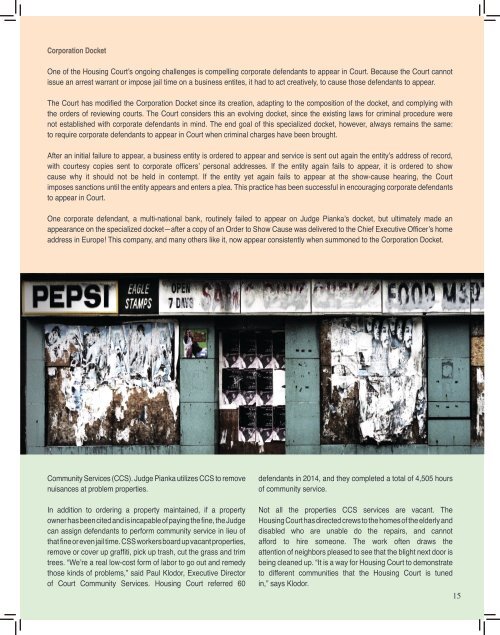publication for website
Create successful ePaper yourself
Turn your PDF publications into a flip-book with our unique Google optimized e-Paper software.
Corporation Docket<br />
One of the Housing Court’s ongoing challenges is compelling corporate defendants to appear in Court. Because the Court cannot<br />
issue an arrest warrant or impose jail time on a business entites, it had to act creatively, to cause those defendants to appear.<br />
the orders of reviewing courts. The Court considers this an evolving docket, since the existing laws <strong>for</strong> criminal procedure were<br />
not established with corporate defendants in mind. The end goal of this specialized docket, however, always remains the same:<br />
to require corporate defendants to appear in Court when criminal charges have been brought.<br />
After an initial failure to appear, a business entity is ordered to appear and service is sent out again the entity’s address of record,<br />
cause why it should not be held in contempt. If the entity yet again fails to appear at the show-cause hearing, the Court<br />
imposes sanctions until the entity appears and enters a plea. This practice has been successful in encouraging corporate defendants<br />
to appear in Court.<br />
One corporate defendant, a multi-national bank, routinely failed to appear on Judge Pianka’s docket, but ultimately made an<br />
address in Europe! This company, and many others like it, now appear consistently when summoned to the Corporation Docket.<br />
Community Services (CCS). Judge Pianka utilizes CCS to remove<br />
nuisances at problem properties.<br />
In addition to ordering a property maintained, if a property<br />
can assign defendants to per<strong>for</strong>m community service in lieu of<br />
trees. “We’re a real low-cost <strong>for</strong>m of labor to go out and remedy<br />
those kinds of problems,” said Paul Klodor, Executive Director<br />
of Court Community Services. Housing Court referred 60<br />
defendants in 2014, and they completed a total of 4,505 hours<br />
of community service.<br />
Not all the properties CCS services are vacant. The<br />
Housing Court has directed crews to the homes of the elderly and<br />
disabled who are unable do the repairs, and cannot<br />
af<strong>for</strong>d to hire someone. The work often draws the<br />
attention of neighbors pleased to see that the blight next door is<br />
being cleaned up. “It is a way <strong>for</strong> Housing Court to demonstrate<br />
to different communities that the Housing Court is tuned<br />
in,” says Klodor.<br />
15



